Challenge
When the news hit that India was halting the shipments of non-basmati rice, the world went into overdrive to gather up as much stock as possible. Rice is the most consumed crop on earth and India is the second largest global exporter.
Through the labors of small landholders, India produced 158,756,871 tonnes of rice last year and rice, needs a lot of water. The crop is sown in June and July into the flooded paddies to be harvested in November and December. The halt to export was in anticipation of a reduced crop based on the hot and dry weather patterns that are evident around the world.
Where is the hope in that? If a major exporter cuts off delivery of the most consumed crop on earth, how can this be good news?
Malwinder Singh Malhi is a friend of mine and a member of the Global Farmer Network. I visited the rice fields in his part of the world, near Ludhiana, India, during my Nuffield studies. Affectionally known to us simply as ‘Malhi” he had posted an important message in regards to the future of Indian agriculture. He said: “Many people assume that the work of farmers is just the drudgery of manual labor. And I don’t deny that it involves a lot of physical effort. Yet it’s also about solving problems through adaptation – and this gives agriculture an intellectual dimension that rewards innovative thinking.”
Planting and harvesting rice does take a lot of manual labor as it is a three step process. First the seedlings are established, then they are all pulled out and replanted further apart. After growing the harvest is often done by hand before the rice goes to be hulled, cleaned and packaged.

Malhi goes onto explain that farmers have started adapting to the heat by leaving crop residue and mulching, cover crops, no till (flooded rice fields are ploughed), rainwater harvesting, rotations, crop diversification and the introduction of new varieties of rice. Despite the bleak outlook, he is excited for the implementation of change that will stabilize rice production.
Opportunity
Regardless of the soil on which you stand, there is an opportunity in the current challenges to consider new ways of knowing and doing and then adapting the farm accordingly. It might mean wholesale change or even a simple investment in infrastructure. Many farms I have visited this year are grateful for the new dug-outs or the rain water capture they have started. We’ve got the technology
It can feel like a trap when wholesale change might be warranted. This however is not defeat. It is the beginning of a new way of knowing and of doing. It is tapping into not only plan B but the variety of dreams and aspirations one has for themselves and their family.
It is important not to self punish for things outside of our control. I recall the year when 80% of my bred cows aborted. It could have finished me as a farmer as I was just starting out and had just bought the land. The circumstance did not win. The vet was crying for me, this mom with two young children but I was OK. I would not let defeat enter into my life so early in the game. We got rid of the problem, rebred, split the herd, culled deep, changed the feeding program, the pastures and the water system and started again. It all turned out rather fantastic and, in the end, I learned something valuable. Like Malhi, I learned that innovative thinking is good practice and rewarding.
This is the season of new creation. It is the time of ideas once parked in the back row to fully come forward and of dreams unlived to unfold. Farmers all over the world are super smart, curious, often technically advanced or better yet, ok with adapting ancient systems that work. They are on the leading edge, everyday, and are more than laborers to our plate. Collectively they feed a hungry and very centralized and highly dependent world. How great is that?
Change Starts Within Us
Change starts with being ok with our inner voice and our desire to examine systems that may have failed us in the past. It starts with taking risk and looking at our operations from another lens.
It is always in the best interest of our community if we are successful and bring positive words into every conversation. Our attitude is contagious and how we view the world affects those in our space. Tough times challenge us to be the spark in a dark world. Change starts there.
Malhi writes in the Global Farmer Network that “Becoming a better farmer isn’t a burden, but rather part of the joy that comes from work well done. “
Together with all the stakeholders in the food system, farmers have delivered on their promise to feed their communities and their world. Our fields, be they of rice or wheat, forage or fodder, will reap again through our diligence, intellect and courage.
2023 Brenda Schoepp
All Rights Reserved

